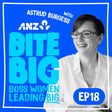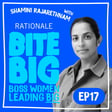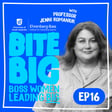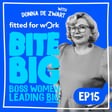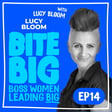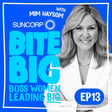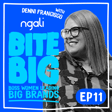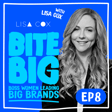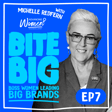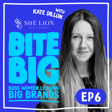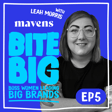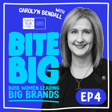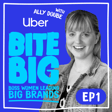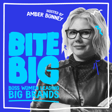
Amber Bites Big with Dr Suji Sanjeevan - medically trained clinical researcher, co-founder of Light & Glo and BrandScent
TRIGGER WARNING
This episode contains depictions of self-harm and suicide that you may find disturbing. If you want to avoid this content, please skip forward to 10.17 sec. If you are experiencing a personal crisis there is a 24hour crisis support and suicide prevention service through Lifeline Australian on
13 11 14.
In Episode 9, Amber Bonney Bites Big with co-host Suji Sanjeevan an exceptional Australian business owner whose intellect, tenacity and resilience has seen her graduate with a medical degree from Kings College London, shape medical policy and research governance in Australia and co-found two successful businesses & appeared on Shark Tank!
Inspired by Amber's own Mantra, "bite big and chew like hell", in this episode we get real and raw about what it was like for Suji growing up in London with family pressures to study medicine, experiencing failure for the first time and her career "rebirth". With exceptional humility, Suji shares how her experience of the all-too-familiar 'glass ceiling' - how being a migrant, a woman and a mother was inhibiting her career options and the actions she took to break that class and become her own "boss woman".
Amber gets under the skin of Suji's mantra, "It's not successful people who are thankful, it is thankful people who are successful", and how being thankful show's up for her in a practical way everyday. Suji speaks from the heart and with gratitude about her success, reflecting on how her failures have helped her achieve all that she is today, including her experience with Channel 10's Shark Tank Australia, the lead-up to her appearance & how she has used it to further benefit her business.
Bite Big has donated $500 to the chosen charity Bridging Lanka a charity that is bridging the ethnic, religious and geographic divides for peace and prosperity in Sri Lanka.
If you would like to know more about our host Amber Bonney her business The Edison Agency or co-host Suji Sanjeevan you can connect and follow these boss women via their socials links below!
Links:
Suji Sanjeevan LinkedIn
Light & Glo
Brandscent
Shark Tank Australia Episode with Brandscent
Brene Brown TED Talk
James Clear - Atomic Habits
The Edison Agency's LinkedIn
The Edison Agency's Instagram
Amber's Instagram
Amber's LinkedIn
Bridging Lanka
If you need crisis support, contact Lifeline
Credits
Host: Amber Bonney
Producer: Niki Beeston
Sound Edit: Fran Toscano, 17th Street Audio
